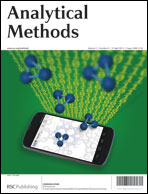Measurement of the catalytic activity of gold nanoparticles synthesized by a microwave-assisted heating method through time-dependent UV spectra
Abstract
Spherical gold nanoparticles (GNPs), with an average diameter of 13 nm, were synthesized and their catalytic activity was measured by a spectroscopic method. The GNPs were synthesized by a microwave-assisted heating method under reflux, using trisodium citrate as the reducing agent. UV spectra and transmission electron microscopic (TEM) analysis were used to characterize the GNPs. The as-prepared GNP solutions were then successfully used as the catalyst in the borohydride reduction of nitrophenols. The reaction could be monitored by the time-dependent UV spectra. The reduction of nitrophenols followed a pseudo-first-order kinetic model and the apparent rate of different isomeric nitrophenols followed the order: m-nitrophenol > p-nitrophenol > o-nitrophenol.


 Please wait while we load your content...
Please wait while we load your content...